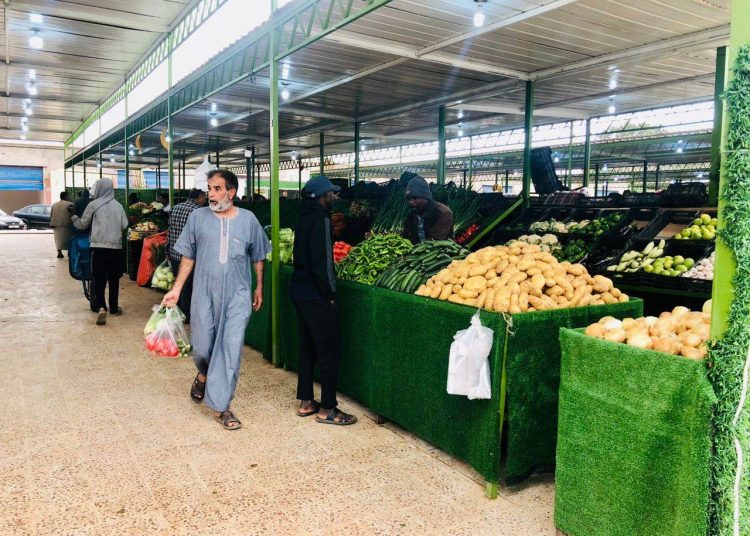Through its follow-up on the prices of vegetables in the Libyan market, Libya Herald noticed a decrease in the general level of prices in the past months during which they rose slightly, while the prices of imported fruits remained the same since last January.
Speaking exclusively to Libya Herald, Abdel Salam Al-Bouzaidi, said the decline in vegetable prices is due to several factors. Al-Bouzaidi is vegetable trader and fruit importer at Sug Al-Ahad (Sunday Market) fruit and vegetable market. The sprawling retail and wholesale market was refurbished and relaunched this March and is located in the Sug Al-Ahad region, about 20 km south of Tripoli.
High supply of some locally produced vegetables
The most important of these, he revealed, is the availability of a high supply of some locally produced vegetables such as potatoes, which are produced in large quantities and with high quality in the months of May, June, and July. Similarly, this applies to tomatoes, which are produced in good quantities during the same months from several farms in Libyan cities, especially from the city of Jallo. Therefore, he explained, the supply of potatoes and tomatoes in large quantities affects general vegetable market prices due to a significant decline in their prices.
Onion prices rose due to shortage in world supply
Regarding the onion crop, whose prices rose during the end of last year and the beginning of this year until Ramadan (March-April), Al-Bouzaidi confirmed that the increase in the price of onions is due to the decrease in the quantities offered in the Libyan market. This is due to a main reason, which is Libya’s dependence on importing it from abroad, and because the supply of onions in the global market has decreased due to shrinking spaces.
It is cultivated, he explained, in producing countries such as Pakistan, but due to floods and climate change, onion prices increased in several countries that depend on its import, including Libya. Al-Bouzidi indicated the high supply of onions in the Libyan market in sufficient quantities, due to the onion harvest season in the farms of the south and the Tripoli areas which starts from the end of April until September.
Stability of prices of inputs and electricity supply
As for the rest of the other vegetables, Al-Bouzaidi stressed that their prices have declined due to their availability in high supply from the farms surrounding Tripoli, in the regions of Wirshafana, Al-Garabouli, Tarhuna, Gaser Bin Ghashir, and others. This, he added, is due to the stability of the prices of seeds and fertilizers and the availability of electricity around the clock.
Cucumbers, zucchini, eggplant, and peppers are also available in sufficient quantities for consumption and with the decline in demand during this period, prices have dropped, he explained.
Imported fruits decrease during production season
Regarding fruits, Al-Bouzaidi said, “Their prices are considered good, especially melons and watermelons, which are produced in large quantities that exceed the needs of the local market. As for other fruits such as peaches, apricots, apples and grapes, most of them are imported from Tunisia, Turkey and Italy, so their prices are considered relatively high and decrease with the fruit-gathering season in those countries’’.
No government encouragement for export of surplus production
Regarding the availability of the necessary support from the government to export the surplus of vegetables and some locally produced fruits, Al-Bouzaidi said that there is no encouragement from the competent government institutions to export the local product abroad. This is especially the case for the crop of potatoes, tomatoes, and melons and watermelons, which are produced in large quantities sufficient for internal consumption with surplus quantities for export. He said this leads to the destruction of these surplus agricultural products due to the lack of any government initiatives for their export.










